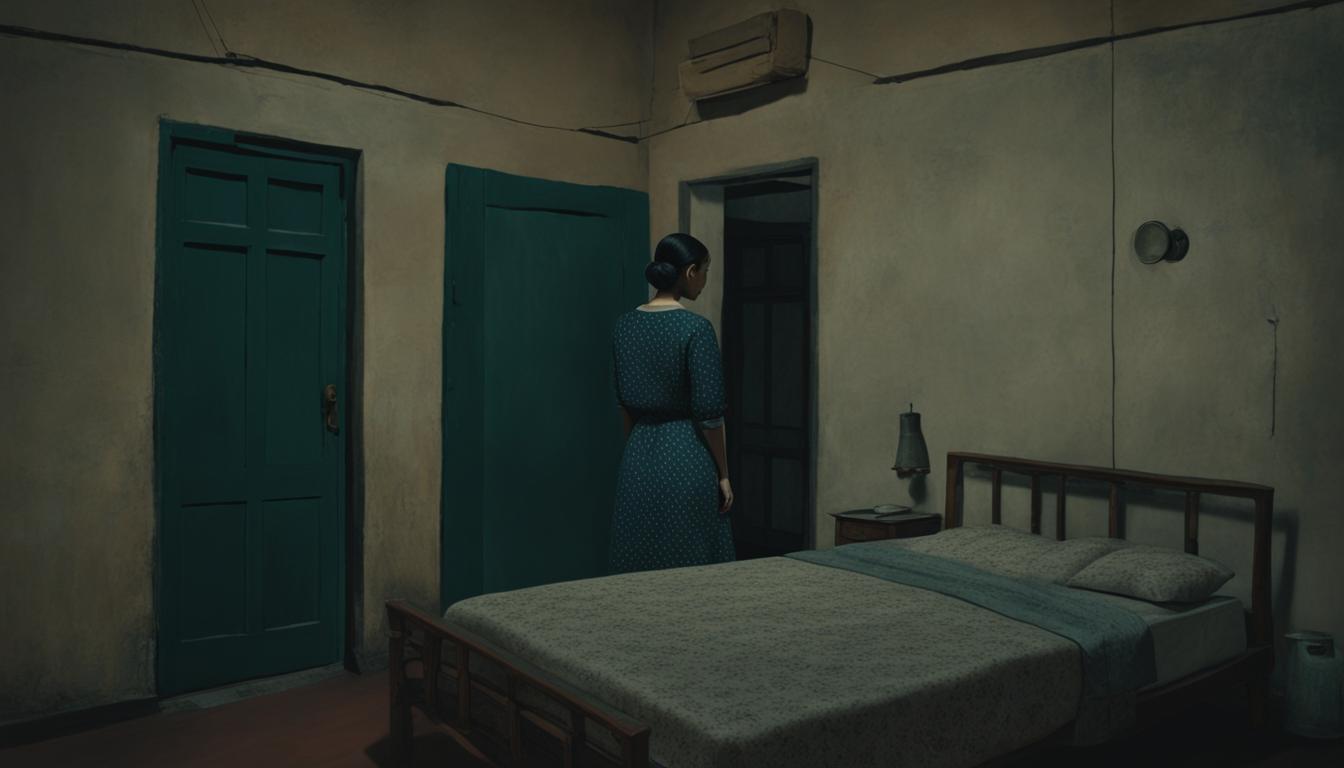If you are looking for a riveting and thought-provoking audiobook, ‘Guest House for Young Widows’ by Azadeh Moaveni is a must-listen. The book provides unprecedented insights into the lives of women associated with ISIS, exploring their experiences as wives, mothers, and fighters.
Azadeh Moaveni, an Iranian-American journalist and writer, brings her extensive experience reporting on the Middle East to bear in this book. Through her meticulous research and first-hand interviews, she uncovers the nuanced realities of life for women associated with ISIS, dispelling damaging stereotypes and misconceptions.
In this audiobook review, we will explore the writing style, narrative, themes, research process, and critical reception of ‘Guest House for Young Widows.’ We will also provide personal reflections and key takeaways from this compelling work.
Key Takeaways:
- Author Azadeh Moaveni provides unprecedented insights into the lives of women associated with ISIS in ‘Guest House for Young Widows.’
- Through meticulous research and first-hand interviews, Moaveni dispels damaging stereotypes and misconceptions about these women.
- ‘Guest House for Young Widows’ explores the themes of radicalization, gender dynamics, and the experiences of women involved with ISIS.
- The book has received critical acclaim for its insightful and compassionate portrayal of a complex and sensitive topic.
- Personal reflections on ‘Guest House for Young Widows’ reveal a newfound understanding and empathy for the women associated with ISIS.
About Azadeh Moaveni
Azadeh Moaveni is an Iranian-American journalist, writer, and academic. She was born in 1976, in Palo Alto, California, to Iranian parents. Moaveni holds a Bachelor of Arts in politics from the University of California, Santa Cruz, and a Master of Arts in Middle East studies from the American University in Cairo, Egypt.
Moaveni began her journalism career in 2000, reporting on the Middle East for Time magazine, Newsweek and The Washington Post. She covered the war in Iraq, the Arab Spring, and the rise of ISIS for these publications as well as The Guardian, The New York Times Book Review, and numerous other outlets.
Besides journalism, Moaveni has also written two books. The first, Lipstick Jihad (2005), is a memoir that explores her life as a young Iranian-American woman covering the Islamic world after September 11. The second, Guest House for Young Widows: Among the Women of ISIS (2019), is a work of journalism that traces the experiences and motivations of women who joined ISIS.
Moaveni is currently a director at the New York University’s Arthur L. Carter Journalism Institute, where she teaches courses on Middle East politics and reporting on conflict.
Introduction to ‘Guest House for Young Widows’
‘Guest House for Young Widows’ by Azadeh Moaveni offers a groundbreaking exploration of the lives of women associated with ISIS. In this book, Moaveni shares unprecedented insight into the experiences of these women, who have often been seen only through a lens of terrorism and violence. By examining their stories and motivations, Moaveni sheds light on a complex and often misunderstood phenomenon, illuminating the impact of extremist groups on women’s lives and the choices they face.
Throughout ‘Guest House for Young Widows,’ Moaveni weaves together in-depth research and firsthand accounts to create a compelling and nuanced portrait of the women involved with ISIS. By placing their stories in a larger societal context, she highlights not only the individual experiences of these women, but also the broader dynamics and issues at play within extremist groups more generally.
The book is a testament to Moaveni’s skill as a journalist and storyteller, as well as her deep commitment to understanding and unpacking complex issues. Through her work, she invites readers to engage with a topic that is often shrouded in misinformation and fear, offering a powerful and humanizing perspective on women’s lives affected by ISIS.
Writing Style and Narrative
Azadeh Moaveni’s writing style and narrative techniques employed in ‘Guest House for Young Widows’ contribute significantly to the book’s overall reading experience. Moaveni’s writing style is characterized by her focus on storytelling, immersing readers in the lives of the women featured in the book. By using vivid language and meticulously crafted images, Moaveni creates a deeply engrossing narrative that educates and inspires readers.
The narrative structure predominantly follows the stories of several women and their lives before, during, and after their association with ISIS. This allows Moaveni to tell these women’s stories in an intimate and personal way, painting a nuanced picture of the complexities of their experiences. Moaveni’s storytelling style helps readers empathize with these women and understand their stories from a more profound perspective.
Overall, Moaveni’s unique writing style and narrative techniques are what make ‘Guest House for Young Widows’ stand out. Through her storytelling, she sheds light on an underrepresented group of women, their lives, and their experiences before, during, and after their time with ISIS.
Themes Explored
‘Guest House for Young Widows’ written by Azadeh Moaveni explores a wide range of themes associated with ISIS women. The book provides deep insight into the experiences of women associated with the extremist group. The author covers several themes, including:
- Radicalization: The process of radicalization and how women become attracted to extremist ideas.
- Gender dynamics: The role of women in ISIS and how gender impacts their experiences within the group.
- Violence: The ways in which ISIS women are involved in violent activities.
- Family: The impact of ISIS on women’s families and how they navigate complex family dynamics.
- Reintegration: The challenges of reintegrating back into society after leaving ISIS.
The author provides a vivid exploration of these topics, drawing from interviews, firsthand accounts, and extensive research. Through personal stories, Moaveni humanizes these women, helps to dispel negative stereotypes, and brings important issues to light.
The Experiences of ISIS Women
One of the primary themes explored by Moaveni is the experiences of women associated with ISIS. She offers a nuanced and complex understanding of the reasons why women become involved with the extremist group and the impact that this involvement has on their lives.
Through interviews with former ISIS women, Moaveni provides readers with personal stories of women who became disillusioned with the group. These accounts provide insight into the difficulties that women faced while in ISIS, as well as the complex reasons why they became involved in the group in the first place.
The book also delves into the role of women in ISIS and their involvement in violent activities. Moaveni describes the role of ISIS women as more than just that of a supportive wife, but also as a combatant and propagandist for the group. This provides a more nuanced view of women’s involvement in ISIS and the dangers they face.
Overall, ‘Guest House for Young Widows’ offers an insightful exploration of the experiences of women associated with ISIS. Through Moaveni’s rigorous research, personal stories, and thoughtful analysis, readers gain an in-depth understanding of the complexities of the lives of women involved with this extremist group.
Research and Interviews
Azadeh Moaveni’s insightful exploration of the lives of women associated with ISIS is grounded in extensive research and numerous firsthand accounts. As an accomplished journalist, Moaveni draws from her journalistic expertise to weave a powerful narrative that provides an intimate look into the complex world of radicalization and its impact on women.
Moaveni’s research process involved in-depth interviews with women associated with ISIS, as well as their families, friends, and local communities. These candid conversations provide a rare glimpse into the experiences of these individuals and offer a unique perspective on the factors that drive individuals towards radicalization.
The author also draws from a wide range of secondary sources, including news articles, government reports, and academic research, to contextualize the personal stories shared throughout the book. This approach adds depth and nuance to the discussion of the complex issues related to ISIS and its impact on women’s lives.

Through her rigorous research and empathetic approach to storytelling, Azadeh Moaveni offers a compelling portrait of the lives of women associated with ISIS. Readers will come away with a more nuanced understanding of the factors that drive radicalization and the impact of this phenomenon on individuals and societies at large.
Critical Reception
Since its publication, ‘Guest House for Young Widows’ has garnered widespread critical acclaim for its insightful and empathetic portrayal of the lives of women associated with ISIS. Literary experts and readers alike have lauded Azadeh Moaveni’s extensive research and firsthand accounts, as well as her compelling writing style and narrative techniques.
A review from The New York Times praises the book as “a valuable and humane contribution to our understanding of a complex issue,” while The Guardian calls it “an impressive feat of storytelling and reportage.”
Book analysis websites also rank ‘Guest House for Young Widows’ highly, with a 4.2/5 rating on Goodreads and a 4.5/5 rating on Amazon.
Overall, the critical reception of ‘Guest House for Young Widows’ reflects the consensus that it is a thought-provoking and important work that sheds light on a multifaceted and often misunderstood topic.
Impact and Discussion
‘Guest House for Young Widows’ has significant impact on the broader societal discussion around ISIS women and their role in extremist groups. The book provides a nuanced and humanizing portrayal of the lives of women who became involved with ISIS, challenging common misconceptions and stereotypes. Azadeh Moaveni’s detailed research and firsthand accounts offer readers insights into the complex factors that contribute to radicalization and highlight the unique challenges faced by women in these circumstances.
The book has sparked important discussions around the ways in which women are indoctrinated and radicalized by extremist groups and brings attention to the long-lasting consequences of involvement with these organizations. It has also contributed to ongoing debates about the role of gender in extremist ideologies and encourages a more comprehensive approach to understanding violent extremism.
Overall, ‘Guest House for Young Widows’ is a thought-provoking and timely read that provides important insights into a complex and often misunderstood topic.
Comparison to Other Works
‘Guest House for Young Widows’ by Azadeh Moaveni is a compelling and insightful read that gives readers unprecedented access into the lives of women associated with ISIS. The book is unique in its focus on the perspectives and experiences of these women, and how they navigate the complex gender dynamics and radicalization within the organization.
While there are other books that explore similar themes, few offer the same level of nuance and firsthand accounts as ‘Guest House for Young Widows.’ For instance, ‘I Was Told To Come Alone’ by Souad Mekhennet provides an investigative journalist’s view into the motivations and tactics of ISIS members, while ‘The Wrong End of the Table’ by Ayser Salman explores the author’s experience as an Iraqi immigrant growing up in the US.
However, despite the differences in approach and subject matter, these books echo similar themes and insights as ‘Guest House for Young Widows,’ highlighting the complex social and cultural factors that contribute to radicalization and the human impact of extremist ideology. By comparing and contrasting these works, readers can gain a more complete understanding of the issue and its broader societal implications.
Personal Reflections and Takeaways
Reading ‘Guest House for Young Widows’ by Azadeh Moaveni was a truly eye-opening experience. Through her meticulously researched and empathetically written book, Moaveni offers a unique insight into the lives of women who were associated with ISIS, providing a rare glimpse into a world that is often shrouded in mystery and misunderstanding.
One personal reflection I had while reading this book was the realization that there is no single narrative when it comes to the women who became involved with extremist groups like ISIS. Rather, each woman’s story is complex and unique, shaped by a multitude of factors including her personal history, upbringing, and social and political context. Understanding these individual stories is key to gaining a more nuanced and accurate understanding of the realities of life for women associated with ISIS.
Another key takeaway from ‘Guest House for Young Widows’ is the critical importance of empathy and understanding in combatting extremism and violence. Moaveni’s book highlights how social and political marginalization, coupled with a lack of educational and economic opportunities, can create the ideal breeding ground for radicalization. By offering a humanizing portrayal of the women involved with ISIS, Moaveni challenges us to re-examine our assumptions and biases, and to approach this complex issue with compassion and understanding.
Overall, ‘Guest House for Young Widows’ is a compelling and deeply thought-provoking book that offers fresh insights into a topic of critical importance. Moaveni’s engaging writing style, coupled with her rigorous research and nuanced analysis, make this book a must-read for anyone interested in the lives of women associated with ISIS, as well as broader issues of extremism and violence in our world today.
Key Takeaways from ‘Guest House for Young Widows’
| Takeaway | Description |
|---|---|
| Complexity of Women’s Experiences | The women who became involved with ISIS have complex and unique stories, shaped by a multitude of factors including personal history, upbringing, and social and political context. |
| The Importance of Empathy | Moaveni’s book highlights the critical importance of empathy and understanding in combatting extremism and violence. |
| Radicalization as a Social and Political Phenomenon | Social and political marginalization, coupled with a lack of educational and economic opportunities, can create the ideal breeding ground for radicalization. |
| A Humanizing Portrayal of Women Associated with ISIS | By offering a humanizing portrayal of the women associated with ISIS, Moaveni challenges us to re-examine our assumptions and biases, and to approach this complex issue with compassion and understanding. |
| The Importance of Personal Narratives | Understanding the individual stories of women associated with ISIS is key to gaining a more nuanced and accurate understanding of their lives and experiences. |
Conclusion
‘Guest House for Young Widows’ by Azadeh Moaveni offers a compelling and insightful look into the lives of women associated with ISIS. Moaveni’s thorough research, extensive interviews, and powerful storytelling make for a gripping and informative read.
Through exploring key themes and issues such as radicalization, gender dynamics, and the experiences of women involved with ISIS, this book raises important questions and challenges commonly held assumptions.
The critical reception of ‘Guest House for Young Widows’ has been overwhelmingly positive, with readers and literary experts alike praising Moaveni’s writing and the depth of her analysis.
Overall, we highly recommend ‘Guest House for Young Widows’ to anyone interested in gaining a deeper understanding of the lives of women associated with ISIS and the complex issues surrounding radicalization and extremism.



